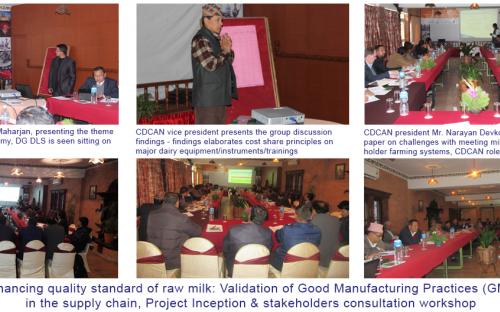Context and Rationale
SAMARTH – NMDP through its implementing partner FORWARD Nepal commenced project start up activities on “Enhancing quality standards of raw milk: validation of good manufacturing practices in the supply chain from 01 February 2016. The project aims to validate application of the draft good manufacturing practices (GMP) in raw milk supply chain from producer to the milk Chilling Centre (MCC) level. This draft GMP was prepared by NDDB with support of Samarth – NMDP.
A one-day project inception and stakeholder consultation workshop was held with an objective to orient the stakeholders about the project and define their roles and mechanisms for engagement of multiple agencies piloting for the validation of the draft GMP in field level.
Event Description
The event took place at Hotel Greenwich Village in Lalitpur on Sunday, 06 March 2016. There were 40 participants from government agencies (DLS, Ministry of Livestock and Poultry Development, DFTQC, NDDB and DDC), NDA, DIA, CDCAN, NGOs and INGOs. Ms. Srijana Rana welcomed the participants and highlighted on the workshop objectives. Dr Keshav Premy, Director General, DLS chaired the entire event and took keen interest for DLS engagement. The following six technical papers were presented by the key stakeholders of the project and discussed in plenary sessions to meet the project objectives mentioned above.
1. GMP project overview and implementation process in M4P approach - Samarth
2. Status of current practices and role of dairy industries in application of GMP to milk processing - DIA
3. Challenges of maintaining milk quality in smallholder settings and role of cooperatives in improving quality of raw milk - CDCAN
4. Policy and legal provisions in milk and its product standards: role of NDDB in GMP application and governance - NDDB
5. Meeting quality standards for raw milk: DLS role in adoption of GMP for clean milk production and marketing - DLS
6. Raw milk standards: role of DFTQC in GMP application, auditing and certification - DFTQC
The necessity for adoption of GMP in the production and supply of raw milk across the entire chain including the processors was realized as prerequisite for maintenance of the quality of milk and its products. It was also realized that meeting quality standards forms foundation of further commercialization/industrialization of dairy enterprises for product diversification and trade in a competitive manner.
The technical sessions and group exercise on three themes, namely investment arrangement, training operations and auditing system, mainly focused on ensuring multi-stakeholder engagement in piloting implementation with recording systems in place for internal audit for milk quality assurance. The workshop has clearly defined and delineated the role of key stakeholders in the project implementation process. The event was successful in developing a common understanding and possible roles in implementation. The excerpts of presentation and recommendations will be compiled and circulated for future reference.
What next
The event has set an enabling environment for selection and finalization of the potential pilot sites (five chilling centres and their milk-shed areas), for having agreements, joint planning and implementation of field level project activities through major milk processors and CDCAN networks; and gathering commitment for cost-share provisions in some project activities including replacement with milk grade/food grade ones of substandard instruments/utensils currently being used in the chain. CDCAN will take key role in backstopping smallholders in adopting GM practices.
Development impact
DLS will mainstream pilot results in production, marketing and supply of raw milk up to chilling centre level. DFTQC has proposed a central level technical committee of government agencies for next level policy action on quality setting of raw milk including mandatory and voluntary provisions on raw milk standards, auditing systems and regulation once pilot results are available. Establishment of internal audit system for monitoring is the key to success for external audit and accreditation.
Some highlights

